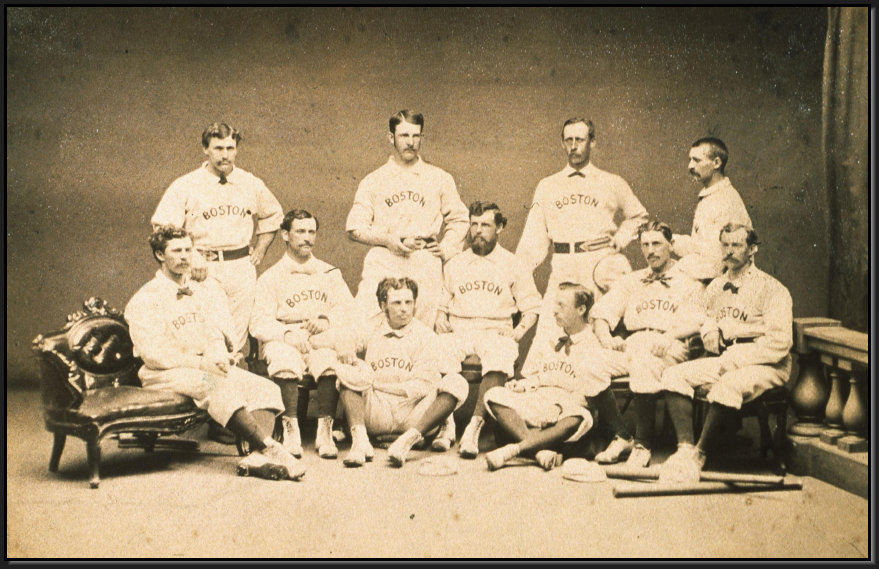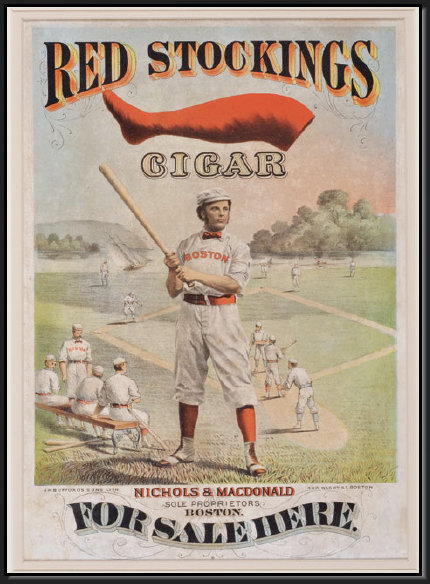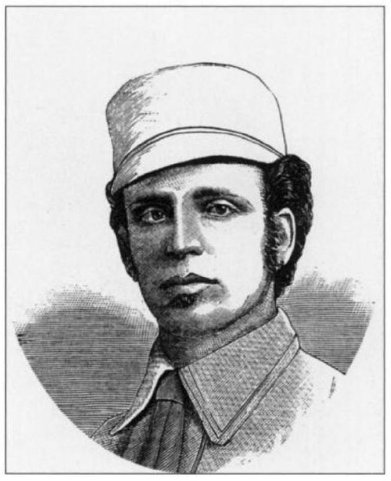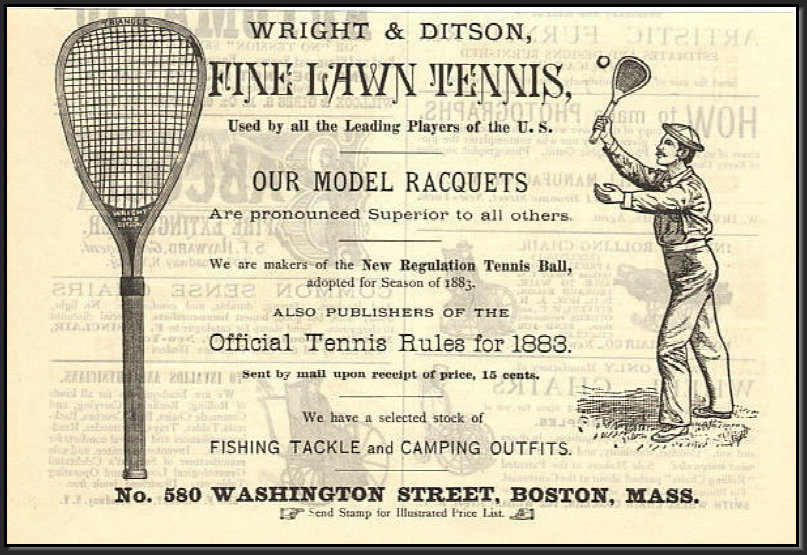No company was more instrumental in the popularization of athletics in nineteenth century America than Wright & Ditson of Boston, Massachusetts. Founded by baseball's first superstar, George Wright, the company revolutionized athletic equipment marketing with high-profile player endorsements, league partnerships, and the aggressive promotion of the health benefits of sports.


George Wright
In 1836, Samuel and Annie Tone Wright emigrated from Sheffield, England to New York, New York, where Samuel was hired as a bowler, coach, and groundskeeper at St. George's Cricket Club, the preeminent cricket club in America. Eleven years later, their son George was born on January 28, 1847. In the 1850's the club and the Wrights moved to Hoboken, New Jersey, the birthplace of America's pastime, baseball. At an early age, George and his older brother Harry worked with their father as cricket pros at the club, helping to teach the game to the club's almost exclusively English-born clientele.
It was on Hoboken's Elysian Fields, the site of the first recorded baseball game in American history, that the Wright brothers demonstrated their cricket prowess playing for the St. George's "Dragonslayers." During one of George's cricket matches Harry and George first observed and became enamored with the faster-paced American game. Already possessing many of the skills required to play baseball, the Wrights picked up the game quickly and by 1862 were star players for the New York Gothams club team.
The end of the Civil War ushered in the boom years of professional baseball. The sport was a favorite pastime of soldiers in camp during the war, and returning veterans became educated and enthusiastic fans. George, at his prime in his early twenties, became a celebrity. After stints with the Philadelphia Olympics and the Morrisania Unions club teams, Wright joined the semi-professional Washington Nationals in 1867. During the National's undefeated mid-west tour, George was proclaimed the best shortstop in the country by The New York Clipper.
It was on Hoboken's Elysian Fields, the site of the first recorded baseball game in American history, that the Wright brothers demonstrated their cricket prowess playing for the St. George's "Dragonslayers." During one of George's cricket matches Harry and George first observed and became enamored with the faster-paced American game. Already possessing many of the skills required to play baseball, the Wrights picked up the game quickly and by 1862 were star players for the New York Gothams club team.
The end of the Civil War ushered in the boom years of professional baseball. The sport was a favorite pastime of soldiers in camp during the war, and returning veterans became educated and enthusiastic fans. George, at his prime in his early twenties, became a celebrity. After stints with the Philadelphia Olympics and the Morrisania Unions club teams, Wright joined the semi-professional Washington Nationals in 1867. During the National's undefeated mid-west tour, George was proclaimed the best shortstop in the country by The New York Clipper.
George Wright c. 1867, www.19cbaseball.com

While George made a name for himself playing in the northeast, Harry found success in the midwest as a player-manager of the fledgling Cincinnati Red Stockings, the first professional base ball team in America. In 1869, the first year that the National Association of Base Ball Players permitted professional players, George signed a contract to play for his brother in Cincinnati for an astounding $1,440 per year. George earned his impressive paycheck. During his two seasons with Cincinnati he was regarded as the greatest star in the game.
Cincinnati disbanded the Red Stockings as a professional team after the 1870 season and the Wright brothers took their talents to Boston to play for the city's first ever professional baseball club, the Boston Red Stockings. The team's owner and founder, Ives Whitney Adams, also extended invitations to other former Cincinnati players, including first baseman C. Harvey Gould and a 21-year old pitcher named Albert Goodwill Spalding. Between 1871 and 1875, George Wright led the Red Stockings to a record of 225-60 and 4 National Association pennants.
In 1874, players from Boston and the Philadelphia Athletics journeyed to England to introduce the British to the American game. The sport didn't make the impression that the tour's organizers had hoped. However, the trip was remarkable for the fact that three of the travel companions, George Wright, Albert Spalding, and Al Reach, would each become an American sporting goods titan in less than ten years.
Cincinnati disbanded the Red Stockings as a professional team after the 1870 season and the Wright brothers took their talents to Boston to play for the city's first ever professional baseball club, the Boston Red Stockings. The team's owner and founder, Ives Whitney Adams, also extended invitations to other former Cincinnati players, including first baseman C. Harvey Gould and a 21-year old pitcher named Albert Goodwill Spalding. Between 1871 and 1875, George Wright led the Red Stockings to a record of 225-60 and 4 National Association pennants.
In 1874, players from Boston and the Philadelphia Athletics journeyed to England to introduce the British to the American game. The sport didn't make the impression that the tour's organizers had hoped. However, the trip was remarkable for the fact that three of the travel companions, George Wright, Albert Spalding, and Al Reach, would each become an American sporting goods titan in less than ten years.
In 1871, George Wright and Harvey Gould started Wright & Gould, dealers in “Cigars, Tobacco, and All Kinds of Base Ball Goods,” at 18 Boylston Street, which also happened to be the office of Adam’s Boston Nine Base Ball Club. At the end of the 1872 season, Gould’s contract with the Red Stockings wasn’t renewed. The following year the business name was listed simply as “George Wright, Cigars & Base Ball Goods,” and would continue to operate under that name until 1880. According to later accounts, George Wright began supplying the Red Stockings uniforms as early as 1871. It is also probable that during this period Wright leveraged his celebrity status to promote, endorse, and resell baseballs and bats manufactured by others to club teams and players in the Boston area.
George Wright, Cigars & Base Ball Goods
Boston Red Stockings c. 1874
George Wright first row, third from left. Albert Spalding second row, second from left
George Wright first row, third from left. Albert Spalding second row, second from left
The marketing potential of George's celebrity was evident in 1874, when he became the first professional athlete to endorse a commercial product and the first baseball player to be credited with authoring a book. J.H. Bufford’s Sons produced a striking lithograph advertisement for Nichols & MacDonald's Red Stockings Cigars depicting Wright and the Boston nine.
It is unknown whether Wright actually wrote "Record of the Boston Base Ball Club, Since its Organization, With a Sketch of All its Players for 1871, ’72, ’73, and ’74, and Other Items of Interest," a 52-page book published by Rockwell and Churchill, or if he was simply paid for his name. Either way, the value of George's endorsement was unquestionable.
Meanwhile, in Chicago, William Hulbert, the owner of the Chicago White Stockings had grown dissatisfied with the disorganization and lack of authority of the National Association and the dominance of the Boston Red Stockings. In 1876, he created a new baseball league, the National League of Baseball Clubs, today's National League. Hulbert was able to entice Albert Spalding and several other Red Stockings to leave Boston for Chicago in 1876, creating a fair amount of animosity between the two clubs. Once in Chicago, Albert and his brother James Walter started A.G. Spalding & Brothers sporting goods and obtained a license from Hulbert to manufacture the official National League baseball and publish the league's official baseball guide. Few realized it at the time, but the first great American sporting goods arms race had begun.
It is unknown whether Wright actually wrote "Record of the Boston Base Ball Club, Since its Organization, With a Sketch of All its Players for 1871, ’72, ’73, and ’74, and Other Items of Interest," a 52-page book published by Rockwell and Churchill, or if he was simply paid for his name. Either way, the value of George's endorsement was unquestionable.
Meanwhile, in Chicago, William Hulbert, the owner of the Chicago White Stockings had grown dissatisfied with the disorganization and lack of authority of the National Association and the dominance of the Boston Red Stockings. In 1876, he created a new baseball league, the National League of Baseball Clubs, today's National League. Hulbert was able to entice Albert Spalding and several other Red Stockings to leave Boston for Chicago in 1876, creating a fair amount of animosity between the two clubs. Once in Chicago, Albert and his brother James Walter started A.G. Spalding & Brothers sporting goods and obtained a license from Hulbert to manufacture the official National League baseball and publish the league's official baseball guide. Few realized it at the time, but the first great American sporting goods arms race had begun.
Henry A. Ditson
Henry Ditson was born in Provincetown, Massachusetts in 1856. His father was a fisherman and his uncle was Oliver Ditson, a prominent music publisher in Boston. By 1875, Henry was living in Boston and working as a clerk. The following year, Henry became a partner in Bird & Ditson, a company listed as a "provisions" merchant (grocery/general mercantile). In 1879, Ditson left Bird & Ditson to work as a clerk for George Wright and by 1880, had become a partner in "Wright & Ditson." While future publications would list 1871 as the date of the company's founding, 1880 was the first time the name Wright & Ditson appeared in the Boston business directory.
In 1880, George semi-retired from professional baseball to focus on Wright & Ditson. The marriage of George Wright’s celebrity, salesmanship, and charisma and Henry Ditson’s organization and marketing acumen gave birth to one of the country’s most iconic sporting goods brands of the late nineteenth century. The men touted the company as “Manufacturers, Importers, and Dealers in Games for Out and Indoor Pastimes,” and by the early 1880's were offering a complete line of uniforms and equipment for baseball, polo, lawn tennis, cricket, lacrosse, football, bicycling, camping, and fishing. With extensive baseball contacts, Wright and Ditson began a barnstorming tour of New England, securing commitments from the leading clubs and associations to use Wright & Ditson equipment. Competing against Spalding's and its license to manufacture the official National League ball, Wright offered free trophies and pennants to champions of high school, amateur, and semi-professional leagues that adopted the Wright & Ditson ball.
George and Henry's business strategy, however, wasn't limited to America's most popular sport. The men aggressively immersed themselves in the promotion of a wide variety of sports and leisure activities. They created and published annual rule and guide books for tennis, polo, football, lacrosse, cricket, bowling and golf. The guides stressed the importance of quality equipment for proper safe play and included pages of advertisements for Wright & Ditson athletic equipment that fit that bill.
George and Henry's business strategy, however, wasn't limited to America's most popular sport. The men aggressively immersed themselves in the promotion of a wide variety of sports and leisure activities. They created and published annual rule and guide books for tennis, polo, football, lacrosse, cricket, bowling and golf. The guides stressed the importance of quality equipment for proper safe play and included pages of advertisements for Wright & Ditson athletic equipment that fit that bill.
The company created its own traveling polo (field hockey) and baseball teams that toured the northeast giving free exhibitions to local teams, and they established clubs to open markets for new products, such as toboggan and snowshoe clubs. Where there weren't established leagues, the pair created tournaments and crowned champions. Henry Ditson's passion was lawn tennis, a new leisure sport popular with the British aristocracy. Ditson correctly predicted the sport's future popularity in America and positioned Wright & Ditson to reap the benefits. Wright & Ditson's lawn tennis tournament in Newcastle, New Hampshire was founded in 1881 and would attract the best players in the country annually for over four decades. By 1883, the company was manufacturing the sport's regulation tennis balls and publishing the official rules of the game. Wright & Ditson lawn tennis racquets became the gold standard, wielded by nearly every National All-Comers champion in the late 1800's.
Red Stockings Cigar Ad c. 1874, Robert Edwards Auctions, Spring 2014
George Wright & Henry Ditson, Wright & Ditson annual catalog 1884
Aggressive Expansion


Samuel & Harry Wright, c. 1862
Chris Hornung
November 24, 2015
November 24, 2015
Maker Spotlight:
The History of Wright & Ditson
The History of Wright & Ditson
1872 Wright & Gould Advertisement, Mort Rogers Photographic Card, Heritage Auctions, April 2011







